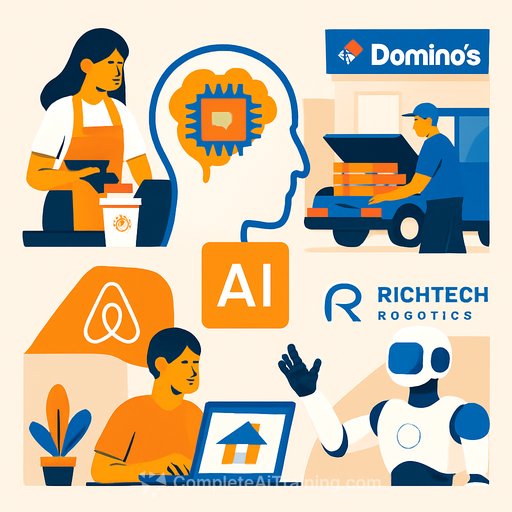AI Integration Boosts Operational Efficiency for Starbucks, Domino’s, Airbnb, and Richtech Robotics
Top companies like Starbucks, Domino’s, Airbnb, and Richtech Robotics are actively adopting AI and robotics to modernize operations and enhance customer experiences. This shift goes beyond buzz—it’s about streamlining processes and cutting costs in practical, measurable ways.
Key Takeaways
- AI and robotics are creating more personalized, efficient customer interactions across major brands.
- These technologies improve operational workflows, helping businesses stay competitive.
- Investors are paying close attention as companies integrate AI, anticipating a shift in market dynamics.
Financial Snapshot of Richtech Robotics
Richtech Robotics (RR) is making significant moves in AI-driven business models, aiming to enhance guest experiences through productivity boosts and service personalization. While the company shows strong cash flow and leverage, its EBITDA margin remains negative, reflecting the challenges of transitioning fully into AI and robotics.
These growing pains are typical for businesses investing heavily in new technology but signal confidence in long-term gains. RR’s recent earnings highlight resilience amidst these shifts, suggesting a promising, if cautious, path forward.
Competitive Pressures and Market Implications
Starbucks, Domino’s, and Airbnb have set clear examples by integrating AI and robotics to disrupt traditional methods. Richtech Robotics’ involvement pushes the competition further, potentially securing an edge for those embracing AI early.
However, these innovations come with high costs. RR’s negative return on assets (ROA) points to efficiency concerns during this transformation. Whether these investments translate into cost-effective operations remains to be seen, making it a critical factor for investors monitoring RR’s market performance.
What Operations Professionals Should Take Away
For those in operations roles, this trend highlights the growing importance of AI and robotics in optimizing workflows and enhancing service delivery. The integration of these technologies can lead to more efficient resource use and better customer satisfaction.
Understanding the financial and strategic implications of AI adoption can help operations leaders make informed decisions that balance innovation with cost control. Cautious evaluation of investment returns and operational impact is essential as these companies navigate early challenges.
Final Thoughts
The move toward AI and robotics in customer-facing industries is reshaping how businesses operate. While challenges exist, companies like Richtech Robotics demonstrate a commitment to evolving their processes and offerings.
Investors and operations professionals alike should watch these developments carefully. Strategic timing and a clear understanding of technology’s role in driving efficiency will be key to successful adoption.
As one market expert advises, the best opportunities come when you can enter without pressure, emphasizing patience and strategy over haste.
For operations professionals eager to build skills in AI and automation, exploring targeted training can provide practical knowledge to stay ahead. Resources like Complete AI Training’s courses by job role offer tailored learning paths to integrate AI effectively within operational workflows.
Your membership also unlocks:






